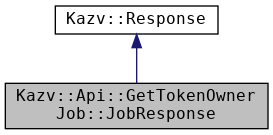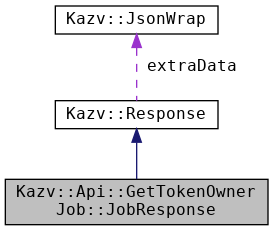Kazv::Api::GetTokenOwnerJob::JobResponse Class Reference
#include <whoami.hpp>
Inheritance diagram for Kazv::Api::GetTokenOwnerJob::JobResponse:

Collaboration diagram for Kazv::Api::GetTokenOwnerJob::JobResponse:

Public Member Functions | |
| JobResponse (Response r) | |
| bool | success () const |
| std::string | userId () const |
| The user ID that owns the access token. More... | |
| std::optional< std::string > | deviceId () const |
| Device ID associated with the access token. More... | |
| std::optional< bool > | isGuest () const |
When true, the user is a Guest User. More... | |
 Public Member Functions inherited from Kazv::Response Public Member Functions inherited from Kazv::Response | |
| std::string | errorCode () const |
| std::string | errorMessage () const |
| JsonWrap | jsonBody () const |
| constexpr bool | success () const |
| json | dataJson (const std::string &key) const |
| std::string | dataStr (const std::string &key) const |
| std::string | jobId () const |
Additional Inherited Members | |
 Public Types inherited from Kazv::Response Public Types inherited from Kazv::Response | |
| using | StatusCode = int |
 Public Attributes inherited from Kazv::Response Public Attributes inherited from Kazv::Response | |
| StatusCode | statusCode |
| Body | body |
| Header | header |
| JsonWrap | extraData |
Constructor & Destructor Documentation
◆ JobResponse()
| Kazv::Api::GetTokenOwnerJob::JobResponse::JobResponse | ( | Response | r | ) |
Member Function Documentation
◆ deviceId()
| std::optional< std::string > Kazv::Api::GetTokenOwnerResponse::deviceId | ( | ) | const |
Device ID associated with the access token.
If no device is associated with the access token (such as in the case of application services) then this field can be omitted. Otherwise this is required.
◆ isGuest()
| std::optional< bool > Kazv::Api::GetTokenOwnerResponse::isGuest | ( | ) | const |
When true, the user is a Guest User.
When not present or false, the user is presumed to be a non-guest user.
◆ success()
| bool Kazv::Api::GetTokenOwnerResponse::success | ( | ) | const |
◆ userId()
| std::string Kazv::Api::GetTokenOwnerResponse::userId | ( | ) | const |
The user ID that owns the access token.
The documentation for this class was generated from the following files:
- src/api/csapi/whoami.hpp
- src/api/csapi/whoami.cpp